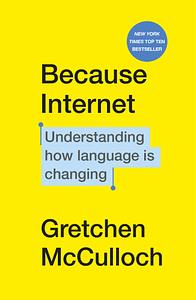Take a photo of a barcode or cover
This was fantastic. I actually did the audiobook and the author did a great job reading her own work. It is all about the history of the Internet and how it has changed and effected the way humans use language.
My favorite bits were her pronouncing asdfgakjhjsk vs. Kglfjshhkd, how addressing emails as ‘Dear Name’ is too formal and too intimate at the same time nowadays, and of course the late great Lolcats language.
There was so much more, things I intrinsically knew but never examined, and Internet history I never realized changed the world.
A fun, humorous, and exploratory read.
My favorite bits were her pronouncing asdfgakjhjsk vs. Kglfjshhkd, how addressing emails as ‘Dear Name’ is too formal and too intimate at the same time nowadays, and of course the late great Lolcats language.
There was so much more, things I intrinsically knew but never examined, and Internet history I never realized changed the world.
A fun, humorous, and exploratory read.
funny
informative
medium-paced
funny
informative
inspiring
A super interesting look at how we use language on the internet. McCulloch's analysis spans linguistics and sociology, breaking down generational differences and touching on international variations. McCulloch aims to find nuances and positive qualities in how we use the internet to communicate, and she presents a solid rebuttal to those who bemoan that texting and lolspeak and the like represent the decline of the English language. It's hard to make a non-fiction book about linguistics that you'd find as compelling as a dramatic novel, but it was a fun read with lots of great trivia, and should leave you feeling more optimistic about our online future.
What a rad read! Interesting, accessible, informative.
If you’re looking for an etiquette/rules book, this isn’t it. If you’re curious about how language is changing (as it always has throughout time), this is the book to read.
If you’re looking for an etiquette/rules book, this isn’t it. If you’re curious about how language is changing (as it always has throughout time), this is the book to read.
So I love linguistic books, and I love them even more when they deep dive into a language I’ve been speaking and have seen evolve since I was thirteen. Internet linguistic is my second favourite type of linguistics after swears linguistics. It’s fascinating to me, especially because the idea that we have figured out new and constantly changing ways to transmit tone to the written word is very, very cool. Also I like being part of something.
I read this book over the summer as soon as I received it in the mail (I know, this review is super late.) It’s a bit of a long book, and I spent so much time hunched over it reading in blocks of five to seven hours at a time that I hurt my neck, and then didn’t have the heart to explain to my chiropractor that I was reading a book about memes. He did still scold me and explained how to properly pull an all-nighter to read, which is part of the reason why my chiropractor is the best. (It involves sitting straight and putting the book on a table, even better if it’s a titling illustration table. But apparently I shouldn’t read for more than an hour at a time, which pssh.)
Gretchen McCulloch gets everything right in this book. Unlike other linguists, you can tell that she is also Very Online, and that she did her research good. The chapter about memes is hilarious, and there is nothing quite like the feeling of turning a page and being face to face with the photo of cat that asks you a cheeseburger. But my favourite chapter is doubtlessly the one about internet generations. I read a long part of it aloud to my boyfriend, and we both agreed that we are firmly from two very different internet generation and that explains why we are constantly frowning at eachother’s memes and punctuation. (It doesn’t 100% apply because we are also both francophones, but most of the internet is in english, so.)
If you don’t have the time to read through a 327 pages book about linguistics, first of all why are you here, but also I recommend Gretchen McCulloch’s podcast Lingthusiam. It’s little bite-sized pieces of fascinating linguistic discussions, and both of the hosts are very funny and relatable.
I read this book over the summer as soon as I received it in the mail (I know, this review is super late.) It’s a bit of a long book, and I spent so much time hunched over it reading in blocks of five to seven hours at a time that I hurt my neck, and then didn’t have the heart to explain to my chiropractor that I was reading a book about memes. He did still scold me and explained how to properly pull an all-nighter to read, which is part of the reason why my chiropractor is the best. (It involves sitting straight and putting the book on a table, even better if it’s a titling illustration table. But apparently I shouldn’t read for more than an hour at a time, which pssh.)
Gretchen McCulloch gets everything right in this book. Unlike other linguists, you can tell that she is also Very Online, and that she did her research good. The chapter about memes is hilarious, and there is nothing quite like the feeling of turning a page and being face to face with the photo of cat that asks you a cheeseburger. But my favourite chapter is doubtlessly the one about internet generations. I read a long part of it aloud to my boyfriend, and we both agreed that we are firmly from two very different internet generation and that explains why we are constantly frowning at eachother’s memes and punctuation. (It doesn’t 100% apply because we are also both francophones, but most of the internet is in english, so.)
If you don’t have the time to read through a 327 pages book about linguistics, first of all why are you here, but also I recommend Gretchen McCulloch’s podcast Lingthusiam. It’s little bite-sized pieces of fascinating linguistic discussions, and both of the hosts are very funny and relatable.
Just meh. I didn’t want to waste my time reading a meh book.
It is clear to most of us that the way we communicate has significantly changed since the internet became ubiquitous. But the cultural and social implications are way more profound than we dare to realize. This book is a great (and light) panorama on linguistics and digital communication, by someone who both gets it and GETS IT. Really recommended!
This was a fun and fast read. I've already recommended it to all my friends with even the slightest interest in linguistics or internet writing.
I haven't read much academic literature since university. I think having to read so much had put me off a little. I am so glad this book came onto my radar- it was really interesting and made me laugh.
This is a book all about how language has changed due to the development and expansion of internet use. McCulloch is obviously so passionate about linguistics: this shines through in her writing and makes the content even more interesting to the reader. It covers memes, grammar, sentence structure, emojis, word choices... everything!
I found out a great deal about language from this book. It has made me consider reading more widely in the field of linguistics. It's fascinating how language has evolved to suit the things which humans want to communicate about and the technologies which we use to do so. I'd often reflected on the changes I had noticed anyway as a Tumblr teen. I come from an interesting generation as, as a child, we had nothing much in the way of online systems. This changed really quickly. I had MSN messenger, and then Tumblr, and now all of the major social media sites.
It was also really positive in its take. I think articles about the internet are often full of despair about the erosion of language, but McCulloch rightly points out that language is there to serve us and that is what the internet has facilitated. Rather than being a new and terrifying thing, the internet is another technological advancement which has allowed a growth in codified informal communication. And informal communication is far from a new thing.
She points out that grammar rules can be a constraint which acts as a barrier to expression for those who do not understand how to use it. I thought that was a fascinating idea too- the internet acts as a democratising tool, allowing all to communicate in the way they wish.
Definitely worth a read, whether you're a linguist or not! We all use the internet and there is bound to be something within these pages that lets you reflect on the way you write or interpret in your online life.
This is a book all about how language has changed due to the development and expansion of internet use. McCulloch is obviously so passionate about linguistics: this shines through in her writing and makes the content even more interesting to the reader. It covers memes, grammar, sentence structure, emojis, word choices... everything!
I found out a great deal about language from this book. It has made me consider reading more widely in the field of linguistics. It's fascinating how language has evolved to suit the things which humans want to communicate about and the technologies which we use to do so. I'd often reflected on the changes I had noticed anyway as a Tumblr teen. I come from an interesting generation as, as a child, we had nothing much in the way of online systems. This changed really quickly. I had MSN messenger, and then Tumblr, and now all of the major social media sites.
It was also really positive in its take. I think articles about the internet are often full of despair about the erosion of language, but McCulloch rightly points out that language is there to serve us and that is what the internet has facilitated. Rather than being a new and terrifying thing, the internet is another technological advancement which has allowed a growth in codified informal communication. And informal communication is far from a new thing.
She points out that grammar rules can be a constraint which acts as a barrier to expression for those who do not understand how to use it. I thought that was a fascinating idea too- the internet acts as a democratising tool, allowing all to communicate in the way they wish.
Definitely worth a read, whether you're a linguist or not! We all use the internet and there is bound to be something within these pages that lets you reflect on the way you write or interpret in your online life.





